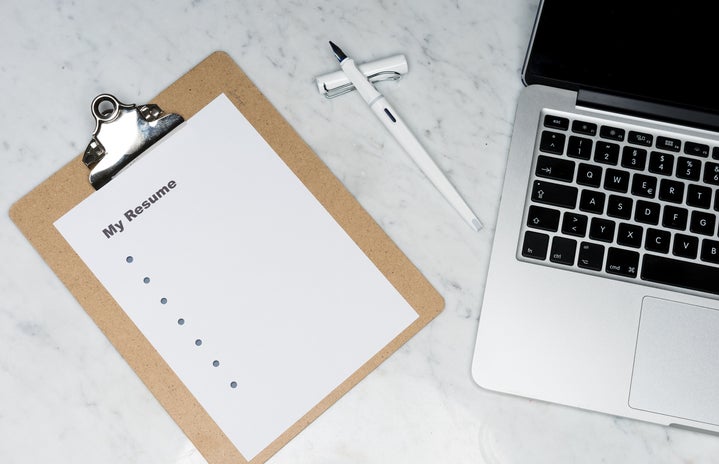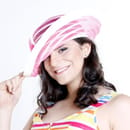Helena Jacob studied Journalism at Unesp (Universidade Estadual Paulista “Júlio de Mesquita Filho”). Since she graduated, in 1997, she worked as graphic designer at newspapers and magazines, such as Lance!, Valor Econômico, Monet and Destak. In 2004, she began her master degree at PUC (Pontifícia Universidade Católica), searching about the images of Brazilian gastronomy at Claudia Cozinha magazine. Nine years later, in 2013, she concluded her doctorate, at PUC too, making research about food and gastronomy in Brazilian media.
In 2008, Jacob started to give classes at Universidade Presbiteriana Mackenzie. A year later, she was hired as Journalism professor at FECAP (Fundação Escola de Comércio Álvares Penteado) and at Faculdade Cásper Líbero, where she became coordinator of the Journalism course and supervisor of course conclusion projects. With a long and diverse career, Helena talked to Her Campus about her trajectory.
HC: Why did you choose to become a journalist?
HJ: I will answer with the cliche narrative (laughs). I love writing and reading since I was a child. When I was alphabetized, I started to want to read my brother’s books and my father’s newspapers. He never signed a newspaper, but he used to buy it in the newsstand every day. Also, my parents used to watch news programs at TV very often. So, my house was full of journalistic materials.
However, until my first year at High School, I wanted to become a physician. My brother was a doctor and I was fascinated by Medicine. But, in the middle of High School, I realized that was not for me. I loved to write, to read and was always searching for news. So, I decided to become a journalist. It was a long time ago and I don’t regret.
HC: Why did you choose the academic career?
HJ: I finished College, began to work in newspapers and magazines. Around seven years after I graduated, I felt I already knew the profession. I liked my job very much, but I was missing the opportunity to study and make deep analysis. In 2004, I decided to achieve my master degree. I always say the process of getting a master degree is the best moment of the career, because is when happens the rediscovery of academic life.
When I finished the master degree, I returned to work in newspapers. So, I stayed three years at Destak Jornal. After that, I started my doctorate and began to teach Journalism at Universidade Presbiteriana Mackenzie. As I was enjoying giving classes and it was very hard to conciliate the pace of the newspaper with the doctor degree. So, in 2009, when I started to teach at Cásper, I decided to dedicate fully to my academic life.
HC: Your master degree research as well your doctorate study were about the news coverage of gastronomy. Could you please tell us an overview of this area?
HJ: In the master degree, my research object was Claudia Cozinha magazine. In the doctorate, I took a large object, studying media spaces and gastronomy in a time when communication vehicles were showing a big interest in this theme. Although Brazilians news about gastronomy are still based on the “tourism guide perspective”, talking about places and restaurants where people can eat and muting about the impact food has in people´s life and in the environment.
HC: When you started to give classes, you used to teach a subject called Magazine’s Journalism, but today you teach Journalism and Entertainment. Are there differences between these two areas? What are they?
HJ: When I started, magazines were a stronger communication vehicle than they are today. In the classes, I used to talk about the magazine’s universe and to teach the students to build pages and publications. In 2012, I began to teach Graphic Planning, but three years later, I assumed the coordination of Journalism course and had to leave some subjects. Yet, the Graphic Planning classes helped me to arrange the Journalism and Entertainment classes, as a lot of entertainment topics were addressed by magazines.
Now, talking about entertainment…
Today, it is very easy to convince people to consume entertainment, while it is getting harder and harder to convince them to consume other kinds of information. The entertainment industry hits 20% of the GDP (Gross Domestic Product) of the USA, including movies, games, streaming services and other cultural attractions. As the entertainment involves a huge amount of possibilities, in my classes, I need to talk about the function of this sector in our lives and to reach a lot of themes.
In College, there is still a separation between Cultural Journalism and Journalism and Entertainment, which are taught in different subjects. However, in my opinion, there shouldn’t be this kind of division. Culture is treated as the space of noble arts, but the entertainment affects the culture, creating new texts, new representations and new habits.
HC: How do you see the future of the entertainment in the Journalism?
HJ: It is hard to talk about the future. Ten years ago, we used to think that streaming wouldn’t be able to charge heavy archives and today we see a lot of streaming services, with huge catalogues. The entertainment tends to grow, to become faster, more constant and more immediate. Some possibilities are using augmented reality and devices installed in the body to bring news and reports about entertainment.
HC: Besides giving classes, you were Coordinator of Journalism course until last year and today you are Supervisor of Course Conclusion Projects. Did these experiences bring improvements to your career as a professor?
HJ: I always say that everybody should have a management experience. These things change the way you see your professional practice. By taking these positions at Cásper, I understood the strong points and the problems of the institution, besides learning how important is to follow the procedures and regulations.
HC: Last but not least, in your opinion, what is the hole of the journalist in the society?
HJ: Being a journalist is getting harder and harder. Today, it is very difficult to show people the difference between information and opinion. Even with data and scientific studies, a lot of people believe what they want. So, the journalist’s job is to keep punching knifes and bring to light information that are important to society.



